An aspiring doctor, Carlos G. Fuentes has made it his mission to do work that supports communities like the predominantly low-income Latino neighborhood where he grew up. Conducting research, he learned, helped him make a meaningful impact as an undergraduate student.
“My drive to uplift my community inspires me the most to do research,” said Fuentes, who graduated May 13 with a bachelor’s of health from the University of Houston College of Education.
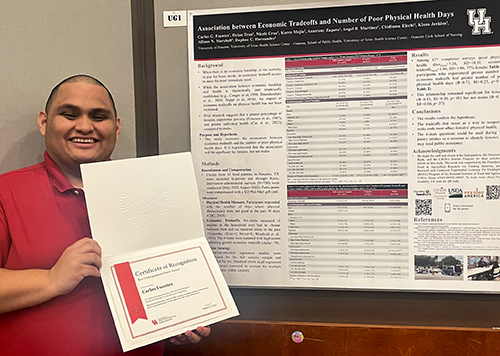
A month earlier, Fuentes had an opportunity to present his research on the relationship between economic hardship and poor health at a research symposium hosted by the College’s Department of Psychological, Health, & Learning Sciences. He earned the Best Undergraduate Poster Award.
The annual PHLS Research Symposium allows undergraduate and graduate students to practice presenting their research findings as they would at a professional academic conference.
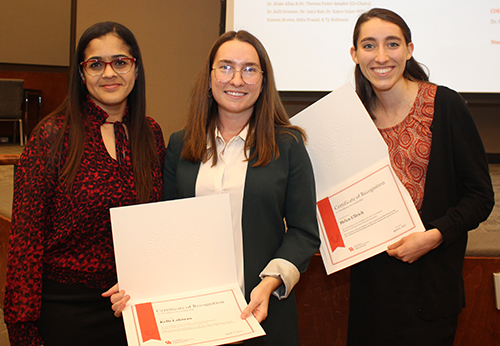
“Student research is an incredibly important aspect of our university and departmental missions,” said doctoral student Helen Ullrich, who co-chaired the symposium. “It’s a mechanism by which we can unearth inequities and inform interventions to promote a more just and healthy society.”
Doctoral student co-chair Kelli Lahman said planning the 2023 symposium provided an unforgettable leadership experience.
“I enjoyed promoting students’ research involvement and collaborating with individuals from diverse backgrounds while learning more about evidence-based approaches to support our Houston community,” Lahman said.
Read more about the work of the award-winning presenters and why they encourage other students to participate in research in the following Q&As.
2023 PHLS Research Symposium Winners
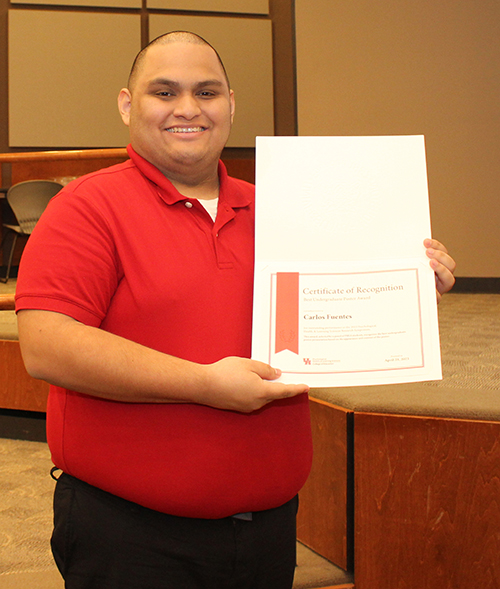
Best Undergraduate Poster Award
“Association between Economic Tradeoffs and Number of Poor Physical Health Days”
Carlos G. Fuentes
B.S. in Health Student
Can you summarize your research findings?
This project sought to uncover whether a relationship exists between economic tradeoffs (having to choose between two basic needs) and the number of poor physical health days an individual will report. We interviewed 750 food pantry clients in the Houston area. We asked them if anyone in their house had to decide between choosing to purchase food and six other basic needs, such paying for child care, medicine and transportation. We found participants who experienced a greater number of economic tradeoffs had more days where they experienced poor physical health. This relationship was significant for females, but not for males. The tradeoffs that women are making as a way to temporarily make ends meet may address an immediate need but at a physical health price for females.
What motivated you to delve into this topic?
As a first-generation Latino college student who grew up in a majority low-income community, I’ve made it a personal mission to engage in activities that seek to enact change within the communities that I am a part of, which have historically been underrepresented in a lot of academic efforts. My motivation was solidified listening to various stories from community members throughout the data collection process of this project.
What inspires you to do research or what do you enjoy about it?
My drive to uplift my community inspires me the most to do research. I learned early on in my undergraduate career that I wanted to find ways to contribute to the advancement of knowledge and make a meaningful impact in the world around me.
What did you learn from participating in the Research Symposium?
It was such a pleasure having the opportunity to not only practice presenting my research findings to an audience, but also listening to other undergraduate and graduate students present their findings.
Anything you would like to share with other students about the value of student research?
Don’t be afraid to get involved! It can be a bit daunting finding opportunities to engage in research as an undergraduate, from scrolling through the numerous professors engaged in groundbreaking research, to having to send interest emails and likely receiving more rejections than success. Starting your journey may not be the easiest. However, your contributions are needed, and the skills you will develop through these experiences are unparalleled.
Faculty mentor for the project: Lee and Joseph Jamail Distinguished Professor Daphne C. Hernandez (UTHealth Houston)
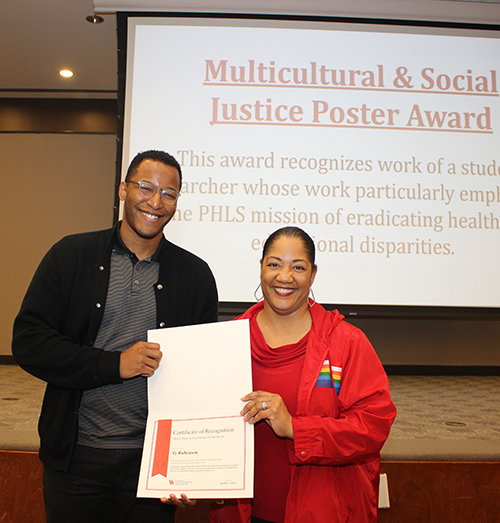
Best Graduate Student Poster Award
Multicultural & Social Justice Poster Award
“Exploring the impact of sexual orientation microaggressions on LGB emerging adults’
coping and sexual health: A qualitative study”
Ty Anthony Robinson
Ph.D. in Counseling Psychology Student
Can you summarize your research findings?
The qualitative study focused on understanding racial/ethnic lesbian, gay and bisexual emerging adults’ experiences with sexual orientation microaggressions, coping, and sexual behavior attitudes. Using focus groups, we found four themes: microaggressions (sexual orientation slurs); reactions to microaggressions (anger, apathy, confusion and self-repression); coping and resilience (hopefulness in teaching the next generation strong ideals of inclusion and acceptance); and education/miseducation about sexual health (HIV is still a “gay” disease). This study adds to an ongoing research agenda to illustrate how the experience of microaggressions may be linked to sexual behavior, and it suggests avenues of resilience that can decrease sexual health disparities in the community.
What motivated you to delve into this topic?
With my interest in studying the impacts racism and discrimination have on the health of racial/ethnic LGBT people, specifically African American LGBT people, I met with Dr. Chakema Carmack after class one day, and it turns out we have a similar research interest. After our discussion, she welcomed me to ongoing lab meetings to discuss the study’s data collection. I want to give a special shout-out to the authors whose contributions are essential to recognize: Aleeah Afzal, Taylor Coleman and Xiomara Sustaita. Our next steps as a team are to write a manuscript and target an LGBT health or psychology-focused journal and contribute to the literature.
What inspires you to do research or what do you enjoy about it?
What inspires me to research my topic of interest is the need for more representation of marginalized groups’ experiences, specifically members of the African American LGBT+ community, to be discussed to inform systemic changes. Their voices need to be heard, and trust with researchers who engage in community work must be gained meaningfully. Working within my community is energizing, and getting the community involved in discussing challenges and needs can be impactful. I also enjoy having the opportunity to meet scholars who are actively engaged in action research.
What did you enjoy about participating in the Research Symposium?
The PHLS Research Symposium was a great opportunity to present my work to my colleagues. We are in our respective labs working with our advisors on projects, and this was an excellent way to come together and show one another what we are doing. Seeing the undergraduate research posters, networking, and sharing good energy with everyone was also nice. I look forward to presenting and seeing new research at the next PHLS Research Symposium!
Anything you would like to share with other students about the value of student research?
Follow the topic you are passionate about, be creative, and don’t be afraid to ask questions. Research is a process, and sharing my rationale, findings and future directions with others excites me. Importantly, take your time to develop a motivating project and find research training opportunities to strengthen your skills and network because you never know if someone will have a good opportunity for you.
Faculty mentor for the project: Associate Professor Chakema Carmack
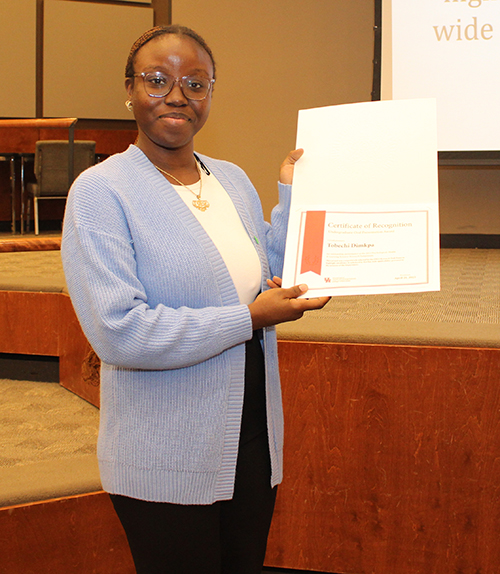
Undergraduate Oral Presentation Award
“E-cigarette prevalence and reasons for use among African American and Hispanic Youth”
Tobechi Dimkpa
B.S. in Health Student
Can you summarize your research findings?
My research examines the use of e-cigarettes among African American and Hispanic youth. I found that Hispanic youth are more likely to use e-cigarettes than African Americans. Things like curiosity, stress, friends and family were reasons for both groups to use e-cigarettes.
What motivated you to delve into this topic?
My mentor is involved in tobacco research, which got me interested in it. I have a passion for minority health and health disparities, so this topic was the best of both worlds to me.
My classes in undergrad made me understand health care disparities. I worked on a project for one of my classes where I did HIV research and found that, even though Black people made up a small percentage of the Houston population, they made up over 50% of new HIV cases in Harris County. Being Black myself was enough of a personal connection for me to want better, and I’m hoping to be part of the change to reduce the disparities.
What did you learn from participating in the Research Symposium?
I enjoyed meeting all the participants and learning about their research. There’s a lot to learn from what other people are doing and can give you ideas for your own research. You make some really cool connections with professors at the symposium too.
Anything you would like to share with other students about the value of student research?
Research helps build your confidence and interpersonal skills. It’s also really fun to do.
Faculty mentor for the project: Associate Professor Virmarie Correa-Fernández
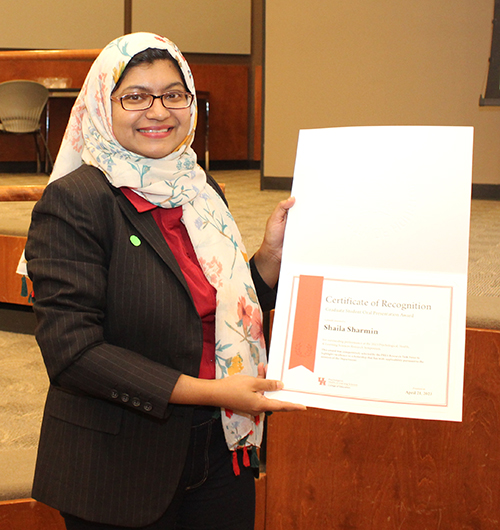
Graduate Student Oral Presentation Award
“Promoting Girls’ Interest in STEM Through Structural Explanations about the Causes
of Gender Differences”
Shaila Sharmin
Ph.D. in Measurement, Quantitative Methods and Learning Sciences Student
Can you summarize your research findings?
Gender gaps in STEM motivation remain a major issue in educational fields due to negative gender stereotypes, such as the belief that boys are better than girls at math or science. These stereotypes make girls assume that they will not be interested, reducing their participation and interest in STEM fields. However, educating girls about external, rather than internal, causes of gender gaps may promote girls’ interest in STEM. Our findings showed that structural explanations for gender differences weakened gender stereotypes and changed girls’ perceptions that their interest in STEM could develop. Such beliefs that interest in STEM is malleable have the potential to impact girls’ motivation in STEM.
What motivated you to delve into this topic?
My motivation behind this research is to empower women in STEM education and minimize the skills gap in the STEM workforce, which can lead society with innovations and sustainable solutions.
What inspires you to do research or what do you enjoy about it?
I am passionate to learn about the social issues that impact human life and contribute to making the world a better place for people regardless of race and gender.
What did you learn from participating in the Research Symposium?
The research symposium provided me an opportunity to learn more about different challenges in psychological and educational fields and the approaches researchers are taking to solve unanswered questions.
Anything you would like to share with other students about the value of student research?
Research plays an important role to learn new ideas, enhance problem solving skills and make a better world for all.
Faculty mentor for the project: Assistant Professor Allison Master
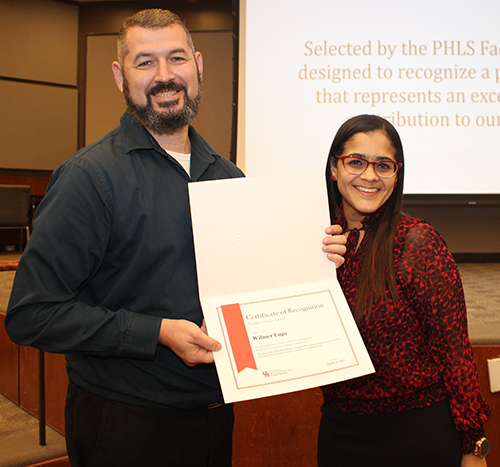
Faculty’s Choice Award
“Motivación pero no presión – Latino men’s perspectives about counseling and family
role in smoking cessation”
Wilmer Lugo
Ph.D. in Counseling Psychology Student
Can you summarize your research findings?
The research was intended to identify the themes and topics relevant to quitting smoking in Latino men in the United States. We found that most do not seek formal counseling and that this population is interested in finding programs that incorporate and address cultural components. In addition, most noted that telling them to stop has the opposite effect, while positive encouragement is a better motivator to quit. Most participants felt it was up to them to quit smoking, and when they did so on their own, there was a high relapse rate. Lastly, participants communicated primarily in Spanish.
What motivated you to delve into this topic?
The CDC estimates that approximately 7% of the Hispanic population smokes cigarettes. This is extremely concerning, particularly since our study indicates that this population is generally reluctant to seek formal help in smoking cessation. Moreover, as most know by now, including interviewed participants, smoking has significant health risks, including premature death and a large negative economic impact on individuals and society at large.
This research was inspired by a study conducted by my lab team that looked into specific smoking cessation treatments for the Latine population. During a secondary analysis of the women who participated concerning the motivation to smoke, smoking behaviors, and what type of support they felt they needed to quit, it was noted that there were some differences with what the men in the group said about those subjects. Therefore, this study continues that research focused on the men’s perspective.
What inspires you to do research or what do you enjoy about it?
Serving our communities is part of my responsibilities as a member of society. Research combines my natural curiosity in addressing questions that can improve our communities’ quality of life and overall well-being. In short, research allows me to serve while satisfying my intellectual curiosity.
What did you learn from participating in the Research Symposium?
There were several things I learned. First, behind the scenes, most research is accomplished as part of a team; I am incredibly grateful for my mentor and teammates who helped me in this endeavor. This would not have been possible without them. Second, it was exciting to share our findings with the other attendees, but it was also an amazing experience to see what other research labs are doing and how they contribute to our understanding of our communities. And lastly, I want to do it again.
Anything you would like to share with other students about the value of student research?
I would tell future students, “Go for it!” It is a lot of work. It can certainly feel overwhelming at times. Yet, there is so much you learn not only about the research topic but also about yourself. You gain knowledge, confidence and a strong sense of accomplishment. Overall, it is an amazingly positive experience.
Faculty mentor for the project: Associate Professor Virmarie Correa-Fernández
— Story compiled by Ericka Mellon
— Photos by Kathy Patnaude and Erica Jordan